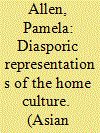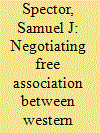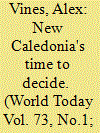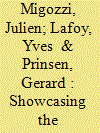|
|
|
Sort Order |
|
|
|
Items / Page
|
|
|
|
|
|
|
| Srl | Item |
| 1 |
ID:
139457


|
|
|
|
|
| Summary/Abstract |
The focus of this paper is the ways in which certain customs and traditions are actively selected and/or reinvigorated and subsequently authorised, by institutions or by individuals, as being key markers of the culture of the ‘homeland’. The cultural practices chosen for discussion are the kejawen mystical system as practised in Suriname and the acquisition of the Indonesian national language, bahasa Indonesia, in New Caledonia. The discussion is informed by two key ideas. The first is that immigrant communities designate certain cultural practices as being worthy of preservation as an ‘inheritance’ for the future. The second is the interplay between cultural practices and power or authority, which gels in scholarly discussions about ‘cultural heritage’. I argue that the continuation of a cultural practice or tradition lies as much with its authorisation by key individuals or institutions as it does with its purported authenticity.
|
|
|
|
|
|
|
|
|
|
|
|
|
|
|
|
| 2 |
ID:
152498


|
|
|
|
|
| Summary/Abstract |
Comparative analyses have found that non-self-governing islands tend to have much better development indicators than sovereign islands. Perhaps unsurprisingly, since 1983 no non-self-governing island has acquired political independence. This paper argues that rather than merely maintaining the status quo with their colonial metropoles, non-self-governing islands are actively creating a new form of sovereignty. This creation of an “Islandian” sovereignty takes place against the backdrop of debates on the relevance of classic Westphalian sovereignty and emerging practices of Indigenous sovereignty. This paper reviews global research on the sovereignty of islands and from this review, develops an analytical framework of five mechanisms that drive the emerging Islandian sovereignty. This framework is tested and illustrated with a case study of the negotiations about sovereignty between New Caledonia and its colonial metropole, France.
|
|
|
|
|
|
|
|
|
|
|
|
|
|
|
|
| 3 |
ID:
102497


|
|
|
|
|
| Publication |
2011.
|
| Summary/Abstract |
The proposal of new negotiation formulae in the midst of stalemated conflicts can help to reframe the problem and restart dialogue. They can also unleash new controversy. The Moroccan Initiative for Negotiating an Autonomy Statute for the Sahara Region is a formulaic proposal advanced by Morocco to describe the broad outlines for Sahrawi autonomy under Moroccan sovereignty. It has been the subject of debate within the international community since it was first introduced in April 2007. Until now, however, discussion of its efficacy as a formulaic basis for a negotiated resolution to the Western Sahara dispute has largely outweighed serious consideration of how the proposal relates to current understandings of international law concerning self-determination and free association. Like Western Sahara, the Cook Islands, Niue, Aceh, New Caledonia, and Bougainville are cases of non-self-governing territories and other high autonomy arrangements where there has been recognition of the need to substitute, as the basis for ending the conflict, a comprehensive negotiated political status, in place of frequently unworkable or unattractive alternatives such as a contentious referendum on independence, open-ended talks, or continued armed conflict. In light of the lessons learned from actual state practice and international responses in the foregoing cases, an assessment of the present Moroccan proposal demonstrates that with some improvements, it may offer a viable new starting point for negotiations. The result of using this plan as a formula to restart negotiations can be the attainment for Western Sahara of a full measure of self-government - in a manner consistent with international law - by means of free association.
|
|
|
|
|
|
|
|
|
|
|
|
|
|
|
|
| 4 |
ID:
152657


|
|
|
| 5 |
ID:
156758


|
|
|
|
|
| Summary/Abstract |
Since 1983, no non-self-governing island connected to a (neo-) colonial European or American metropole has acquired full Westphalian sovereignty and these islands continue to operate within constitutional frameworks that connect them to these metropoles. Large majorities in referendums on several of these islands have rejected full sovereignty. This paper opens with a review of the essential elements of the concept of sovereignty in a historical and global context, before studying how sovereignty is unfolding in new forms in non-self-governing islands in the Pacific and the Caribbean. As a case study, an analysis is presented of how pro-France (loyaliste) and pro-independence (indépendantiste) parties in New Caledonia are negotiating sovereignty with France. Evidence is given of how these New Caledonian parties are creatively using classic Westphalian signifiers of sovereignty normally reserved for sovereign states such as flags, diplomatic representations and international treaties, while still negotiating New Caledonia's sovereignty with France. This suggests that in contrast to Westphalian sovereignty, a unique ‘Islandian’ concept of sovereignty is emerging. Islands that are not sovereign in a Westphalian sense can creatively disassemble and reassemble signifiers of Westphalian sovereignty to strengthen their continuous negotiations with their metropoles and their neighbours.
|
|
|
|
|
|
|
|
|
|
|
|
|
|
|
|
| 6 |
ID:
129553


|
|
|
|
|
| Publication |
2014.
|
| Summary/Abstract |
Charles de Gaulle's visit to Quebec in 1967 continues to attract significant scholarly and popular attention. Despite ongoing efforts to broaden our understanding of the evolution of France-Quebec relations during the 1960s, de Gaulle's visit remains the pivotal event of that rapprochement and is believed to confirm the French president's personal support for Quebec's independence, stemming from his efforts to position post-colonial France as the champion of decolonization and self-determination for dependent peoples. This scholarly consensus, however, can be challenged by even a cursory glance at France's policies toward New Caledonia in the 1960s, which reflected a fierce French determination to prevent the loss of its Pacific Ocean territory. Instead of accepting, much less encouraging, New Caledonia's autonomy, the French state in fact re-colonized New Caledonia over the course of the 1960s, a situation that compels us to examine more closely the attitude of de Gaulle and the French state toward "decolonization" in Quebec during the same period. The national aspirations that mattered most to France or to de Gaulle were those of France itself.
|
|
|
|
|
|
|
|
|
|
|
|
|
|
|
|
|
|
|
|
|